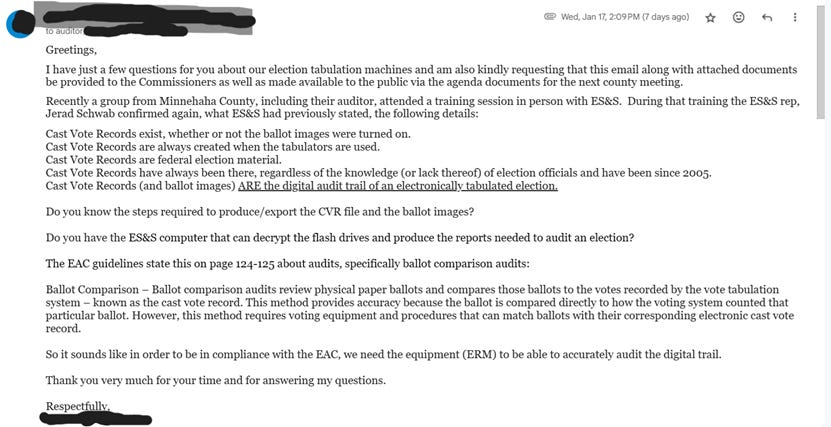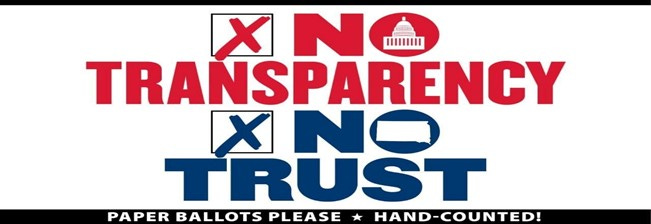SB48 – Cast Vote Records - What a Roller Coaster ride, and we aren't off of it yet!
On 4 January 2024 we delivered you the news “VINDICATION AT LAST!!!! NOW CVR's are PUBLIC RECORD?” Please take just a few minutes and reread that article. It lays out the history of what we have been up against with CVRs.
January 24th, 2024 the Senate State Affairs Committee heard SB48. Chief “election deniers are communists” Lee Schoenbeck was excused, and SOS Monae Johnson and Deputy Diedrick didn’t bother to show up.
Of no surprise to us, proponent testimony from the SOS office was provided by Rachel Soulek. She miraculously admitted to the committee that the ES&S tabulators DO capture CVRs and if turned on, the ballot images are produced, as well. She testified that 62 of the 66 counties in South Dakota are NOT EQUIPPED with the required ES&S Electionware software/laptop/printer, to produce the excel database of the captured CVRs or pdf ballot images of the scanned ballots. She testified that this bill would not force counties to purchase the needed software, and that it would be up to them if they WANT to participate. The total cost for 62 counties was calculated to be approx $642K. She further testified that she believes that the post-election audit, passed into law during the 2023 legislative session, would prove that machines and tabulators are accurate.
Rick Weible provided proponent testimony, but ONLY with an amendment, which he submitted to the committee for their review. (and they ignored) He provided the details that would bring this proposed bill into compliance with current state statute and federal law. He expressed that he was pleased that the SOS office brought this forward, as we want this information made public, (it IS public record) but there needed to be updates. He provided the committee access to the FULL Electionware guide (not just the 22 pages that our auditors receive), the EAC certificate, the entire Voluntary Voting System Guidelines, and other pertinent documents.
His first requested edit was to this section: “These returns shall be open to the public and the cast vote record and the ballot images collected from the automatic tabulating equipment, if any, are public records.” His amendment struck through “if any”, as CVRs and ballot images are created simply by feeding ballots through a tabulator automatically. The default setting for a tabulator is to capture and save images.
His second edit was for this section: “Nothing in this section may be construed to require the person in charge of the election to capture the cast vote record or ballot images.” Under State statue 12-17B-2, the EAC Certification Requirements were adopted as law, therefore CVR’s and ballot images became mandatory, not optional. Not “capturing” them is a violation of law, and then makes the machine out of compliance with EAC requirements, making it necessary to de-certify the machines; which then could NOT be used in an election!
Realizing that a supported amendment was a long shot, Minnehaha County Auditor Leah Anderson, gave opponent testimony. She spoke about her experience as a financial auditor guides her as a county auditor. She expects the “system” to provide a transparent audit trail and obtainable proof. Proof of the full voting “transaction.”
She went on to cover that CVRs and ballot images are necessary to audit an election. She echoed the sentiment that it was a struggle to decide whether to support or oppose this bill, and that she opposes it as written. She passed on that during recent training with ES&S, they stated publicly that CVRs are created no matter what, they are there. She acknowledged the limitation to view and share (NOT CREATE) this data is access to Electionware software.
She reminded the committee that a previous Secretary of State had the ballot image capture function turned off due to a gross misinterpretation of the law. Taking a picture of someone else’s ballot and sharing it vs. having a ballot image from the tabulator is not the same. Ms. Anderson further reiterated that there is a federal requirement to capture this data and it’s created whether she wants it or not. It takes 5 minutes to produce the CVR report and the only options for selection is the format of the exported document. ES&S, the NIST, HAVA and the EAC provide that cast vote records are intended for audit purposes, and for the general public, and that the continued pursuit to hide this information is furthering distrust in our elections.
Jessica Pollema provided additional opponent testimony to the bill “as-is”, beginning with the fact that since 2021, citizens across the state have been asking for CVRs. She provided a copy of an email from the SOS office Election Director which stated “CVRs do not exist”. She further testified that our auditors were all unaware of CVRs, and that citizens' endless attempts to produce the truth resulted in virtually all counties denying CVRs, based on false information. Lawsuits have been filed and are still continuing in court.
She further testified that at the June 2023 SOS meeting with executives from ES&S, they admitted that South Dakota does not train election officials on CVRs or audit logs. Both requirements standardized in 2005. This technology is from the era of the Motorola flip phone. The technology standards are from 2005 with an audit tool that is 18 years old.
Jessica reiterated that CVRs are not proprietary, are 100% available, do not identify voters, and the county owns the data (SO the CITIZENS own the data).
The contracts that the counties signed with ES&S require full training and operational proficiency on operating the hardware and software. (ES&S is in violation of their contracts here.) She listed several federal laws requiring the production and retention of documents for 22 months, which entails any records produced in an election process. If the legislature were to pass this law “as-is”, they would be in violation of federal law, and could be subject to HAVA complaints and federal lawsuits.
She also suggested that if the committee had questions, to please address them to Mr. Weible, who is an expert and has all the federal documentation right there in the room with him.
During rebuttal, Rachel Soulek testified that a former administration had “turned off” the ballot images based on legal guidance they had at the time. She mentioned the cost associated with all counties obtaining the necessary Electionware at $642K and again stated that the post-election audit process should be good to show machines are doing what they are supposed to be doing. She has full confidence in our machines.
The committee then only asked questions of Ms. Soulek. Sen. Wheeler seemed to understand the fact that CVR’s are automatic and that the language in the bill was contradictory. He also asked about imposing an unfunded requirement on the counties that they couldn’t afford.
However, Wheeler did say this “For the counties that do have cast vote records available and extractable, I mean, you should be able to SHARE those.”
Wow – talk about getting through a brick wall. Even David Wheeler understands this now.
Sen. Nesiba asked if HAVA funds could be used or that maybe a special appropriation for this bill would be necessary. Soulek testified that this expense is allowable under HAVA, but that the SOS office believes that our post-election audits should be good and that the office has different goals and ideas for the HAVA money.
Monae Johnson’s administration has re-directed $4.5 million of HAVA funds to “upgrade” the dysfunctional uncertified, internet-connected Bpro/Total Vote system. $4.5 million that was requested by former SOS Steve Barnett for post-election audits and equipment upgrades. Re-allocating these funds for a purpose other than what they were requested for is a violation of HAVA. To date, HAVA has not received necessary paperwork to reallocate these funds. Her administration also neglected requesting the $1 million allowance for South Dakota for 2022 and 2023, and now the window for the application has closed. $6.5 million that could have easily covered these counties providing them something they should have had 18 years ago!
The committee killed the bill with no amendments as it was not ready.
Here is the link to the audio from the committee – it’s worth a listen:
https://sdpb.sd.gov/sdpbpodcast/2024/sst11.mp3
So what is next?
Well, we don't anticipate counties will roll over very easily to purchase Electionware on their own accord as is evident by this exchange between a citizen and her county auditor:
What will your auditor/commission say about complying with saving the election records produced during your county election, which are intended for the general public??
Do you have a copy of your county officials sworn oath? Who did they swear an oath to?
2024 is the FINAL Battle! Please continue to educate, share information, advocate for hand counting, and be a warrior for transparent elections. No Transparency, No Trust!







